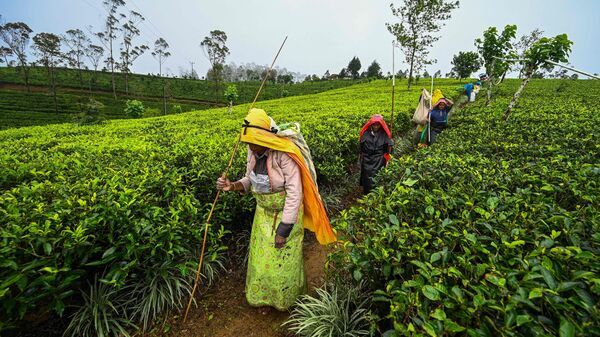Sri Lanka’s dollar earners deserve dignity, not conditions

By Robert Antony
It is deeply concerning that Sri Lanka’s upcountry plantation workers, the backbone of the nation’s economy, must still fight for a fair wage despite their immense contribution to the country. Through the export of tea and rubber, these workers generate nearly $2.5 billion in foreign exchange annually, yet their livelihoods remain a contentious and troubling issue, casting a shadow of shame over the nation.
President Anura Kumara Dissanayake’s 2026 budget announcement to increase the daily wage of plantation workers from Rs 1,350 to Rs 1,750 has been met with cautious optimism by the community. While this acknowledges decades of neglect and hardship, it also raises pressing questions about the conditions tied to the increase.
The Rs 400 increase is to be split between the plantation companies and government, each contributing Rs 200. However, reports suggest that the government’s contribution is contingent upon a strict condition: workers must complete 25 days of attendance per month to qualify for the increase. Although officials deny this, the lack of transparent clarifications has fuelled widespread concern.
“The wage increase is welcome. Someone has done a job no one else could, and it should be called an achievement,” one plantation sector worker said, but noted that the 25-day attendance requirement was problematic, as they have five days off in addition to the Poya day holiday, and sometimes needed extra days to go to the hospital or attend weddings, or funerals.
Engine of Foreign Exchange
The economic service rendered by the plantation workers cannot be overstated. According to the Central Bank’s 2024 report, the tea sector alone earned $1.45 billion, complemented by $1 billion from the rubber sector, accounting for $ 2.5 billion or Rs 762.5 billion in foreign exchange earned annually.
With Sri Lanka’s annual export revenue hovering around $12 billion, the $2.5 billion earned from tea and rubber exports account for nearly 18% of this total. During the 2022 dollar-crisis, when the country struggled to find even $40 million for essential fuel imports, and other sources of foreign currency like foreign direct investment and tourism stalled, revenue from tea exports remained a crucial and steady lifeline.
For a community that has served as the country’s economic backbone for over 200 years, working tirelessly without demanding extravagances, it is not only a moral duty but a national obligation to ensure they receive a fair wage. The government’s Rs 200 contribution is minimal compared to their contributions, yet the controversial attendance condition threatens to undermine the sincerity of this gesture.
Burden of Attendance Condition
The key point of contention is the rumoured condition tying the government’s Rs 200 contribution to the 25-day attendance requirement for each month. According to Professor A. S. Chandrabose, Senior Lecturer in Social studies, Open University of Sri Lanka, such a condition is a violation of the fundamental rights and human dignity of the plantation workers, a group who face some of the highest poverty rates in the country.
World Bank and LIRN Asia data from 2023 indicate that while national poverty rate stood at 26%, the burden on upcountry plantation workers was disproportionately high. Illnesses, family emergencies, social obligations, and other realities often make 100% attendance practically unattainable.
Historically, workers were required to meet a 75% attendance threshold (around 18 days) to receive attendance allowances – a bar already difficult to reach. Imposing a 100% attendance requirement is not only unrealistic but seen by many as a mechanism to deny workers their rightful earnings.
Harsh Truth
Noting that inadequate management and working conditions compound the problem, Professor Chandrabose says the 25-day work guarantee is often not upheld. “Due to poor maintenance, lack of proper fertilization, and companies attempting to maximize profits at minimum cost, workers are not guaranteed full work days. How can the ’25-day condition’ apply on days when no work is provided?” he asks, flagging concerns that companies that cannot provide work are essentially using the government condition to cut the workers’ rightful salary, describing it as “blatant exploitation”.
Faced with mounting challenges, that range from climate change to soaring fertilizer prices and fluctuating global markets the tea and rubber industries urgently need improved management efficiency. Instead of placing attendance conditions on the labourers, the government needs to call for management efficiency and negotiate to ensure attendance incentives become a guaranteed part of the basic wage, uncoupled from monthly attendance.
Dignity Through Unconditional Wages
While the increase of Rs 1,750 per day offers relief against rising living costs, the conditional attendance clause risks depriving workers of the full benefit. The only just approach is a dignified wage paid in full, without conditions, as a genuine token of appreciation for the tireless labour of these essential workers.
Ensuring unconditional, fair wages is not just a labour issue, it is a matter of justice and respect for a community that has been the pillar of Sri Lanka’s foreign exchange economy and its socio-economic fabric for generations.
–Robert Antony, a multiple award-winning journalist, currently serves as Assistant Editor at Virakesari


Comments are closed, but trackbacks and pingbacks are open.